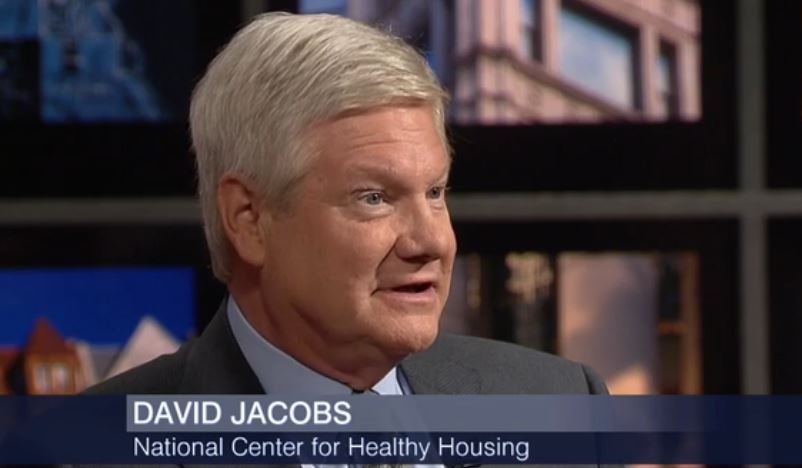NCHH30 Throwback Thursday
Week 55: June 15, 2023
by Christopher Bloom
NCHH turned THIRTY on September 4, 2022, so we’re celebrating with a new “Throwback Thursday” photo each week.
This week, we revisit “Taking a Closer Look at Lead Exposure,” a June 21, 2016 episode of WTTW’s evening news program, Chicago Tonight, which was filmed in response to the news that dangerous levels of lead were detected in the drinking water of several Chicago-area public schools. As you may recall, all of the attention on lead-contaminated and polluted water came as a result of the series of failures that culminated in thousands of Flint, Michigan residents being left without drinkable water.
Our Dr. David Jacobs, NCHH’s Chief Scientist, appeared on a panel to discuss lead poisoning with Dr. Julie Morita, Chicago’s Health Commissioner, and Dr. Susan Buchanan, director of the Occupational Medicine Residency program, also at UIC’s School of Public Health. Dr. Jacobs is an authority on the effects of lead in the body. We should also mention that in between his two stints at NCHH, Dr. Jacobs was the director of HUD’s Office of Healthy Homes and Lead Hazard Control. He also serves as an adjunct associate professor for the School of Public Health at the University of Illinois at Chicago. It would be fair to say that these panelists know a thing or two about lead!
It’s a great panel, and after a bit of searching, we’re happy to say that we were able to find the full episode online. You’ll find it embedded at the end of this post.
Dr. Jacobs started off with a 30-second crash course for the viewers at home on the dangers of lead exposure: “Lead is […] one of the best studied toxic substances that we know of. It’s one of the metals that you don’t need in your body; it has no useful biological value whatsoever. It creates a range of effects. The most important […] we think are the neurodevelopmental effects for children at an early age, but it also causes cancer, kidney disease, and many other adverse health effects.”
And how can parents know whether their water is safe if their children exhibit no obvious signs of having been exposed to lead?
“You should test it,” urged Dr. Jacobs. “You first have to find out which pipes [and surfaces] actually have lead […]. Once you know that, then you can use proven steps to remediate it using both short-term and long-term measures. I mean, we know how to fix this problem; it’s simply a matter of applying the scientific knowledge we have to make a difference.”
This is an interesting point, because Dr. Jacobs expressed how important it is to determine where lead exists, but in the case of pipes, that’s easier said than done. We bring this up because just a few years later, NCHH was fortunate enough to work with some more great minds from the windy city: Rayid Ghani from the University of Chicago (now with Carnegie Mellon University) and Janna Kerins (Medical Director, Environmental Health) and Raed Mansour (Director, Office of Innovation) from the Chicago Department of Public Health (CDPH). In the webinar Getting Ahead of Lead: Can Predictive Modeling Help Prevent Childhood Lead Exposure? (2019), they describe an innovative collaboration between the University of Chicago and the CDPH. Using two decades of blood lead level tests, home lead inspections, property value assessments, and census data, the team designed a model that predicts the risk of a child being poisoned so that an intervention can occur before the exposure. The model allows inspectors to prioritize houses on a long list of potential hazards, identifying the children at the greatest risk for lead exposure. Their pioneering work in the use of machine learning and predictive analytics in public health has the potential to have a significant impact on both health and economic outcomes for communities across the U.S., which is why we wanted to share it again, especially in light of the Biden-Harris Administration’s commitment last January “to supporting and accelerating the replacement of lead service lines across the country” (see “NCHH Joins the Biden-Harris Get the Lead Out Partnership“).

NCHH Chief Scientist Dr. David Jacobs on “Chicago Tonight,” June 21, 2016.
We hope you’ll take some time this month to watch the fascinating and inspiring Getting Ahead of Lead webinar as well the Chicago Tonight segment with doctors Buchanan, Jacobs, and Morita, which begins around the 9:15 mark in the video below.
See You Next Week
We hope that you’ve enjoyed this throwback in honor of our 30th anniversary. Remember that we’ll post a new throwback every Thursday morning at 9:04 a.m. on Facebook, Instagram, LinkedIn, and Twitter through September 2023. If you’ve missed a previous post, you can always reminisce with us via our NCHH30 gallery.
 Christopher Bloom is NCHH’s communications and marketing manager. He joined NCHH in 2008 after nearly a decade in the real estate industry. In a previous role at NCHH, he coordinated a national Renovation, Repair, and Painting (RRP) training program, one of the most successful in the nation. He holds a Bachelor of Arts degree in English Textual Studies from Syracuse University.
Christopher Bloom is NCHH’s communications and marketing manager. He joined NCHH in 2008 after nearly a decade in the real estate industry. In a previous role at NCHH, he coordinated a national Renovation, Repair, and Painting (RRP) training program, one of the most successful in the nation. He holds a Bachelor of Arts degree in English Textual Studies from Syracuse University.